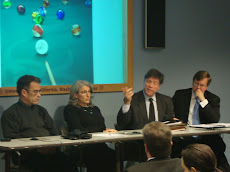In Britain, says Flynn, the discrepancy between the estimate of the numbers of people who would die from flu and the reality was dramatic. "In the United Kingdom, the Department of Health initially announced that around 65,000 deaths were to be expected. In the meantime, by the start of 2010, this estimate was downgraded to only 1,000 fatalities. By January 2010, fewer than 5,000 persons had been registered as having caught the disease and about 360 deaths had been noted," says his report.
The public health minister, Gillian Merron, told Flynn in a meeting for the report that a Cabinet Office investigation was looking into Britain's handling of the outbreak and would report some time after June. Countries across Europe reacted very differently to the pandemic, says the report. Not all mounted high-profile vaccination campaigns, as did the UK.
Flynn's draft accuses the WHO of a lack of transparency. Some members of its advisory groups are flu experts who have also received funding, especially for research projects, from pharmaceutical companies making drugs and vaccines against flu...Meanwhile, a Reuters article reports that WHO will have its handling of the Swine Flu epidemic reviewed by a panel of independent experts selected by WHO:
"A group of independent experts will review how the H1N1 pandemic has been handled to ensure that the next global health emergency is dealt with better," a top World Health Organisation official said on Monday. . .Surprisingly, The Lancet has elevated scurrilous comments to the level of reportage, in a March 20-26 article by Priya Shetty titled "Experts concerned about vaccination backlash." A former president and communication officer of the European Society of Clinical Microbiology and Infectious Diseases, Giuseppe Cornaglia, claimed,
The review, starting in April, will be conducted by 29 experts, drawn by WHO regional offices from a pool of scientists and public health officials nominated by member states.
WHO Director-General Margaret Chan will report their preliminary findings to the WHO's annual World Health Assembly in May, with the final report due to be ready for the 2011 World Health Assembly, Fukuda said.
"Sending a clear message, however erroneous it might be, is how the anti-vaccination movement scored big with H1N1. Their message was simply, 'Vaccines are the devil.'"In contradistinction to Cornaglia's claim, I would submit that the transmission of factual information on the H1N1 epidemic (and available vaccines) resulted in fewer people choosing to be vaccinated, because they were able to make an appropriate risk/benefit decision for themselves and their children. Deaths and injuries from swine flu can be counted in the developed world, but those from the vaccines cannot be--not with the level of knowledge and epidemiological tools currently available.
According to Tevi Troy, past deputy Secretary of DHHS,
The US decsion not to use adjuvants, which effectively expands the supply of the vaccines, stemmed in part from concerns about how the anti-vaccine groups would have reacted to adjuvants."I would instead suggest that by accessing accurate information about adjuvants, and responding to the information, the public conveyed to its policymakers that it did not want these untested vaccine additives used for a disease associated with an extremely low mortality rate. It is unfortunate the policymakers needed to be prodded, but very positive that the decision to omit novel adjuvants was made. This probably helped prevent numerous future chronic autoimmune disorders.










No comments:
Post a Comment